INTERNACIONAL
«No me gustan los lunes»: la escalofriante confesión de una adolescente que mató a dos personas en un tiroteo escolar
“No me gustan los lunes”, aseguró Brenda Spencer, una adolescente estadounidense de 16 años cuando un periodista le preguntó por qué había iniciado un tiroteo en la Escuela Primaria Grover Cleveland.
Ocurrió en enero de 1979, en la ciudad de San Diego, en California, cuando la joven disparó con un rifle desde la ventana de su casa y mató a dos personas. También hirió a ocho chicos de entre 6 y 12 años, y a un policía, que recibió un tiro en la garganta.
Leé también: “Unas voces me lo pidieron”: el macabro caso de Kip Kinkel, el joven que asesinó a sus compañeros de escuela
Spencer se entregó después de la masacre, lo que conmocionó a todo Estados Unidos: es considerada una de las primeras tiradoras escolares registradas en la historia de ese país.
Cómo ocurrió la masacre
En la mañana del 29 de enero de 1979, Spencer buscó un rifle que le había dado su padre un mes antes como regalo de Navidad. Era un arma de calibre 0.22. Alrededor de las 8:30, decidió apuntar a la escuela primaria que estaba justo frente a su casa y empezó a disparar.
La adolescente, que tenía 16 años en ese momento, disparó 36 veces en total desde una ventana. Sin embargo, la dramática secuencia se extendió por más de seis horas, ya que se atrincheró en su casa y enfrentó a agentes del SWAT (Special Weapons And Tactics, Armas y Tácticas Especiales en español).
La policía, sus padres y amigos trataron de convencer a Spencer de detener los disparos y entregarse. Incluso, habló con un periodista del medio local The Evening Tribune, a quien le dijo que había iniciado la masacre porque “no le gustaban los lunes”. “Esto me alegra el día”, confesó en esa llamada.
Durante el tiroteo, ella mató al director de la escuela Burton Wragg, de 53 años, y a un empleado de limpieza Mike Suchar, de 56. Además, hirió a ocho alumnos, que tenían entre 6 y 12 años, mientras que un policía se salvó de milagro después de recibir un balazo en la garganta.
Luego de varias horas, Spencer decidió salir de su casa, ya que los negociadores ofrecieron comprarle una hamburguesa en un local de comidas rápidas. Fue así cómo se la llevaron detenida. El momento de la detención de Brenda Spencer. (Foto: Canal 8 de San Diego).
Una condena eterna
La chica fue llevada a juicio en 1980 y fue juzgada como un adulto. Si bien su defensa intentó argumentar que tenía demencia, al final de las audiencias se declaró culpable de dos cargos de asesinato y agresión. Por este motivo, el Tribunal de San Diego la condenó -después de cumplir los 18- a dos cadenas perpetuas.
Spencer tuvo su primera audiencia para solicitar la libertad condicional después de 13 años. Allí, declaró que, en la mañana en la que ocurrió el hecho, había consumido drogas y alcohol, aunque los análisis toxicológicos que le hicieron ese día habían dado negativo. La Justicia rechazó esta solicitud.
En una entrevista, la mujer dijo que no recordaba mucho de lo que había pasado, pero sí afirmó que ella creía que, al momento de disparar, era atacada. “Recuerdo haber visto afuera y ver un comando apuntándome. Tenía que protegerme”, dijo a CBS 8 San Diego en 1993.
Durante su estadía en la cárcel, le diagnosticaron epilepsia y depresión, motivo por el cual está medicada hasta la actualidad. La adolescente fue condenada a penas concurrentes de entre 25 años de prisión y cadena perpetua. (Foto: CBS).
A Spencer, que hoy tiene 62 años y está alojada en la Institución de Mujeres de California, se le negó la libertad condicional en 1993, 2001, 2005, 2009, 2022 y en febrero de este año. En esta última ocasión, la fiscal del condado de San Diego, Summer Stephan, dijo que “la conmoción de este crimen sigue ocupando un lugar de infamia en la historia de tiroteos masivos” de Estados Unidos.
Leé también: Asesinó a 23 personas en un shopping y evitó la pena de muerte por pedido de las familias de las víctimas
Y concluyó: “Si bien existen nuevas leyes que pueden acelerar potencialmente la liberación de personas que fueron condenadas cuando eran menores, así como de reclusos mayores de 50 años, nuestra posición es que la totalidad de las horribles circunstancias de este crimen y este caso no justifican la liberación”. Brenda Spencer en una entrevista con CBS 8 de San Diego. (Foto: CBS).
Además de ser uno de los casos más estremecedores de la historia criminal estadounidense, el tiroteo de Spencer inspiró la canción I Don’t Like Mondays (”No me gustan los lunes”) de la banda Boomtown Rats. El cantante Bob Geldof se enteró de la noticia por la radio y escribió la letra después de que se dieran a conocer las declaraciones de la joven.
Si bien se posicionó en el puesto número uno en Reino Unido -y se convirtió en el mayor éxito del grupo irlandés-, no se lanzó como sencillo en Estados Unidos por respeto a las familias de las víctimas.
Estados Unidos, Tiroteo
INTERNACIONAL
Panorama Internacional: 146.500 bombas de Hiroshima, 80 años después, ¿qué no aprendimos?

El arsenal actual
INTERNACIONAL
Trump’s Senate closer: Republican freshman emerges as key White House ally
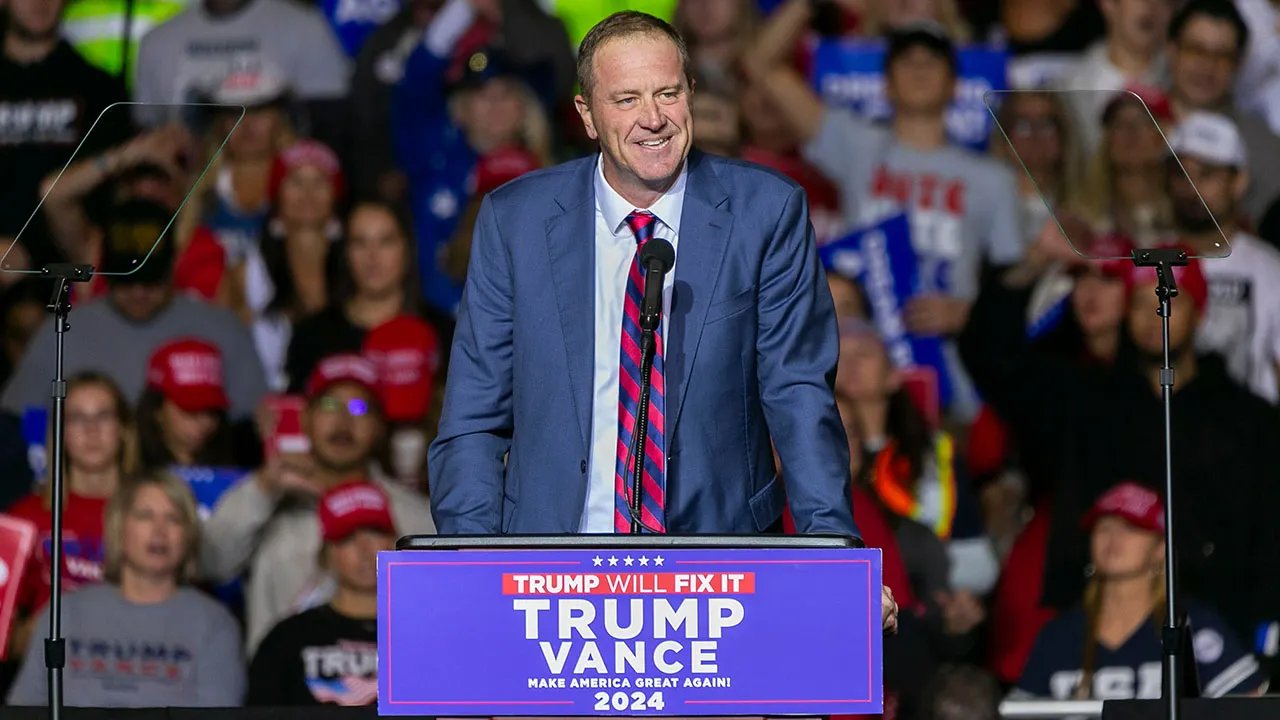
NEWYou can now listen to Fox News articles!
FIRST ON FOX: Senate Republicans last month were able to advance President Donald Trump’s desire to clawback billions in federal spending, an effort carried to fruition for the first time in nearly three decades by a first-term senator.
While the effort to slash funding to NPR, PBS and foreign aid was born in the White House, it was executed thanks in large part to Sen. Eric Schmitt, R-Mo.
Schmitt, who was first elected to the Senate in 2022, has become an envoy of sorts for Trump’s agenda in the upper chamber. He has a strong relationship with the president that dates back to his first campaign, which has developed into a regular invite to join Trump for rounds of golf.
‘LONG OVERDUE’: SENATE REPUBLICANS RAM THROUGH TRUMP’S CLAWBACK PACKAGE WITH CUTS TO FOREIGN AID, NPR
Senator Eric Schmitt, a Republican from Missouri, during a campaign event with former President Donald Trump, not pictured, at the Fiserv Forum in Milwaukee on Nov. 1, 2024. (Jim Vondruska)
He’s launched probes against former President Joe Biden’s alleged mental decline, helped smooth over concerns during passage of Trump’s «big, beautiful bill» and contends that «intuitively» he understands the president’s America First message.
And his role in bridging the gap between the White House and the Senate, along with negotiating among his conference to get the $9 billion package across the line, has seen his stock rise immensely within the Senate GOP.
But, in an interview with Fox News Digital, he said his entire goal is to just be helpful.
«I think I approach it with that kind of humility,» Schmitt said. «But I also, I want to be successful, and I want the agenda to move forward. I think it’s really important. Being on the golf course with President Trump is a great honor, and we have a lot of fun. He’s a very good golfer.»
Schmitt, who previously served as Missouri’s attorney general before launching a bid for the Senate, regularly clashed with the Biden administration and said that his role of rebuking lockdowns, vaccine mandates, censorship and mass migration informed how he currently views legislating.
SENATE TO DEBATE TRUMP’S $9B CLAWBACK BILL AFTER DRAMATIC LATE-NIGHT VOTES

President Donald Trump tees off during the opening ceremony for the Trump International Golf Links golf course, near Aberdeen, Scotland, on July 29, 2025. (AP Photo/Jacquelyn Martin)
«My job was to stand in the gap and fight back, with the hopes that President Trump would return,» he said.
Trump endorsed Schmitt in 2022, and in return the lawmaker became one of the first senators to back his reelection campaign the following year. That turned into Schmitt becoming a mainstay on the campaign trail, jetting across the country in Trump Force One where «Big Macs and double cheeseburgers and quarter pounders with cheese» flowed.
And when Trump won, Schmitt had the opportunity to leave the Senate and join the administration as attorney general, but he opted to stay in the upper chamber.
Had he jumped ship, Trump’s recissions package may not have been able to pass muster with the Senate GOP, where appropriators raised concerns about the impact that clawing back already agreed-upon spending would have on the government funding process and others raised issues with the funding that was targeted.
«This wouldn’t have happened without Eric Schmitt,» Sen. Katie Britt, R-Ala., told Fox News Digital.
Britt was part of the same 2022 class of freshman senators as Schmitt, which included other notable Republicans, like Sen. Markwayne Mullin, R-Okla., and Vice President J.D. Vance.
She said Schmitt’s leadership on the rescissions package, like listening to lawmakers’ concerns and negotiations with Senate Appropriations Committee Chair Susan Collins, R-Maine, to take the lead on the package, led to a final product that could actually pass in the diverse Senate GOP.
‘SHOULD HAVE BEEN PREPARED’: GOP SENATORS FIGHT FOR UNIFIED MESSAGE ON TRUMP’S ‘BIG, BEAUTIFUL BILL’
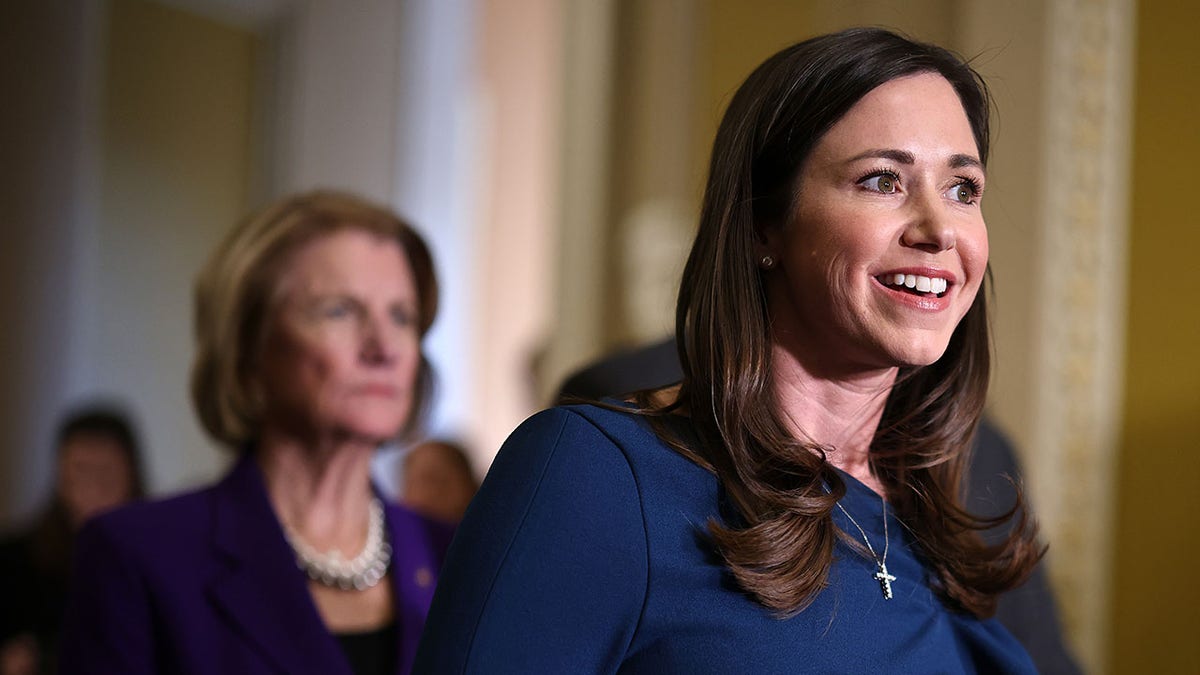
Sen. Katie Britt talks to reporters following the weekly Senate Republican Caucus policy luncheon at the U.S. Capitol on January 14, 2025, in Washington. (Chip Somodevilla)
Indeed, Schmitt agreed to allow as many amendments to the bill as lawmakers wanted and included his own change to the clawback that would save funding for global AIDS and HIV prevention — a key change that helped bring more Republicans on board.
«When Eric speaks, people listen,» Britt said. «And he is thoughtful about when he uses his voice, and when he does it most definitely makes an impact.»
Schmitt, however, is more humble in how he views his part in the process.
«People can label,» Schmitt said. «I don’t get too hung up on any of that. Like for me, honestly, I feel fortunate to be in the position that I’m in. There’s really not a lot of daylight between the President’s agenda and the things that I support.»
Still, he was hopeful that another recissions package would come, describing it as «a good exercise for us,» but noted that the timing for the remaining fiscal year would be tricky given the GOP’s continued push to blast through Democrats’ blockade on nominees and the looming government funding deadline when lawmakers return after Labor Day.
But getting the first one done was key to opening the door for more.
«I think that was also part of what was on the line,» he said. «When we were, you know, in the middle of the night, trying to make sure we had the votes, was that we have to prove that we have the ability to do it. And once you do it, there’s muscle memory associated with that. There’s a cultural shift in how we view things.»
CLICK HERE TO GET THE FOX NEWS APP
However, Senate Minority Leader Chuck Schumer, D-N.Y., has demanded that Republicans commit to a bipartisan appropriations process and eschew further rescissions packages.
Should another come from the White House in the waning days of this fiscal year, it could spell trouble in Congress’ bid to avert a partial government shutdown by Sept. 30.
«I really think it would be a bad idea for Republicans to alter our course of action based on what Democrat threats are,» Schmitt said. «At the end of the day, they’re an obstructionist party without a message, without a messenger.»
politics,senate,donald trump,republicans
INTERNACIONAL
Trump’s deadline on secondary tariffs arrives; US-Russian relations hang in the balance

NEWYou can now listen to Fox News articles!
President Donald Trump is preparing to announce new secondary tariffs Friday on nations who conduct trade with Russia amid its deadly war in Ukraine.
The White House has remained tight-lipped on what those tariffs will look like after the president first said in July they would amount to «100%» tariffs before causing confusion earlier this week when he told reporters he «never said a percentage.»
While the specifics of what tax rates nations that trade with Russia could face remain unclear, Trump’s change in posture toward Russian President Vladimir Putin has become increasingly evident.
President Donald Trump, right, meets Russian President Vladimir Putin on the first day of the G20 summit in Osaka, Japan, June 28, 2019. (Kremlin Press Office/Handout/Anadolu Agency/Getty Images)
FROM TALK TO TACTICS: TRUMP PIVOTS ON RUSSIA STRATEGY TO END WAR
«Trump’s frustrated that the Russians have not taken advantage of his patience and generous offers, but it’s very interesting that even after Trump announced he was moving submarines, and even after he announced the tough tariffs, the Russians still want to talk to him,» Fred Fleitz, who served as a deputy assistant to Trump and chief of staff of the National Security Council during the president’s first term, told Fox News Digital.
«Putin does not want to anger Trump,» he added. «Putin never worried about angering Biden, and I think that this shows a degree of respect.
«It shows what Trump has achieved by exercising leadership on the global stage. And we’ll see what happens,» Fleitz said, adding he hoped it was not merely a stalling tactic by Putin.
Trump’s return to the White House brought with it a sense of shock as he appeared to distance Washington from its top allies in Europe in favor of attempting to improve diplomatic relations with Putin, culminating in the infamous Oval Office showdown with Ukrainian President Volodymyr Zelenskyy in February.
While the tussle brought renewed support from his top MAGA base, who favor ending U.S. involvement in foreign wars, it prompted concern among security experts. Ultimately, Trump’s patience with Putin began to shift, with the president consistently expressing his frustration at the Kremlin chief’s continued brutal attacks in Ukraine.
In mid-July, while sitting next to NATO Secretary General Mark Rutte, Trump announced Putin had 50 days to enter into a ceasefire or face «very severe» tariffs that would affect Moscow’s top commodity, oil.
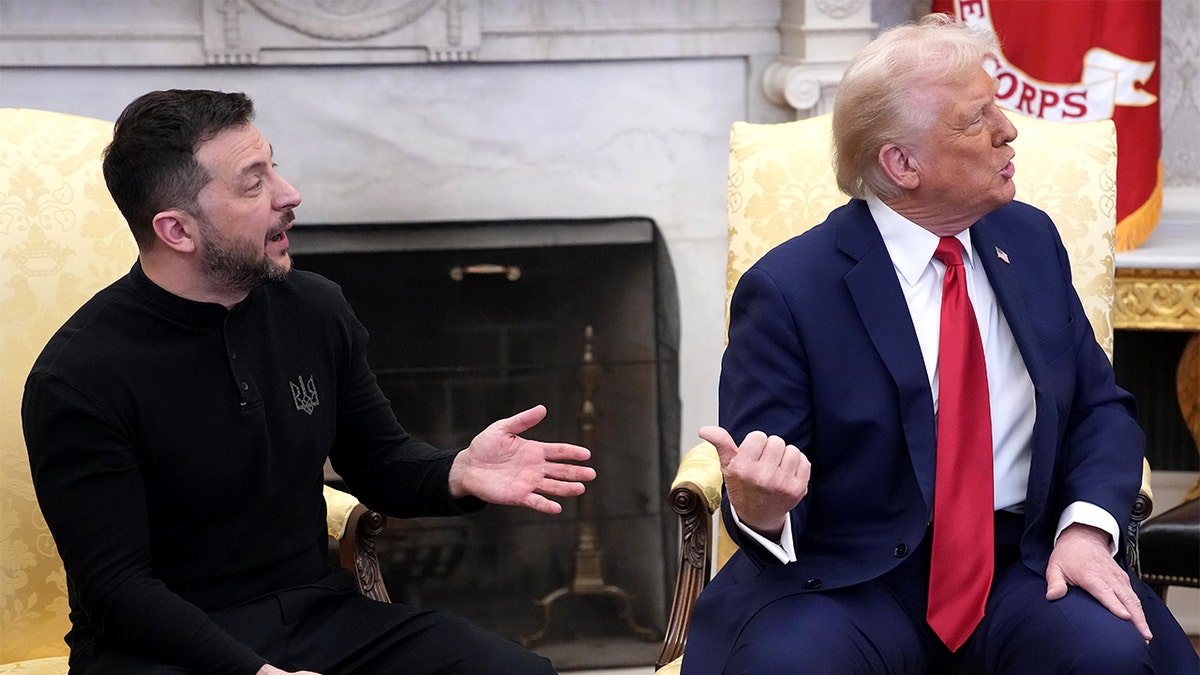
President Donald Trump and Ukrainian President Volodymyr Zelenskyy meet in the Oval Office of the White House Feb. 28, 2025, in Washington, D.C. (Andrew Harnik/Getty Images)
ZELENSKYY TELLS PUTIN TO ‘BE BRAVE’ AND FINALLY AGREE TO TRILATERAL MEETING WITH TRUMP
«Tariffs at about 100%, you’d call them secondary tariffs,» he had said, indicating that nations that trade with Russia will see 100% tariffs slapped on them when trading with the U.S.
This would most greatly affect China and India, according to data released by the U.S. government Thursday, which showed both nations account for 46% of all Russian oil purchases in 2025.
But the U.S. is also the No. 1 export market for both China and India, which means higher price tags at the checkout line on their products will make Americans think twice before completing those purchases.
After ongoing trade negotiations with both nations and Putin’s continued war effort in Ukraine, Trump last week pushed up his deadline to within 10 days of July 29, forcing a new deadline of Friday.
But while his promised tariffs were met with applause by some in the GOP, including Sen. Lindsey Graham, R-S.C. — he, along with Sen. Richard Blumenthal, D-N.Y., is pushing the charge for 500% sanctions on Russia — other Republican members have not backed the move.
Sen. Rand Paul, R-Ky., has been outspoken against not only Trump’s tariffs but the bipartisan sanction push and argued to Fox Business’ Larry Kudlow this week that Trump’s tariffs on allies and foes alike will amount to $2 trillion in taxes for the American consumer.
But Fleitz pushed back on this argument and said he is not convinced that the tariffs will hurt the U.S. or Chinese economy, though Russia and India are likely to feel the pain.
«I think they’re going to hurt the Russian and Indian economies,» he said, noting that India could recover by buying oil elsewhere. Though some reporting has suggested that India may have saved over $30 billion by increasingly turning to Russian oil during 2022-2024 due to Moscow’s price cuts.
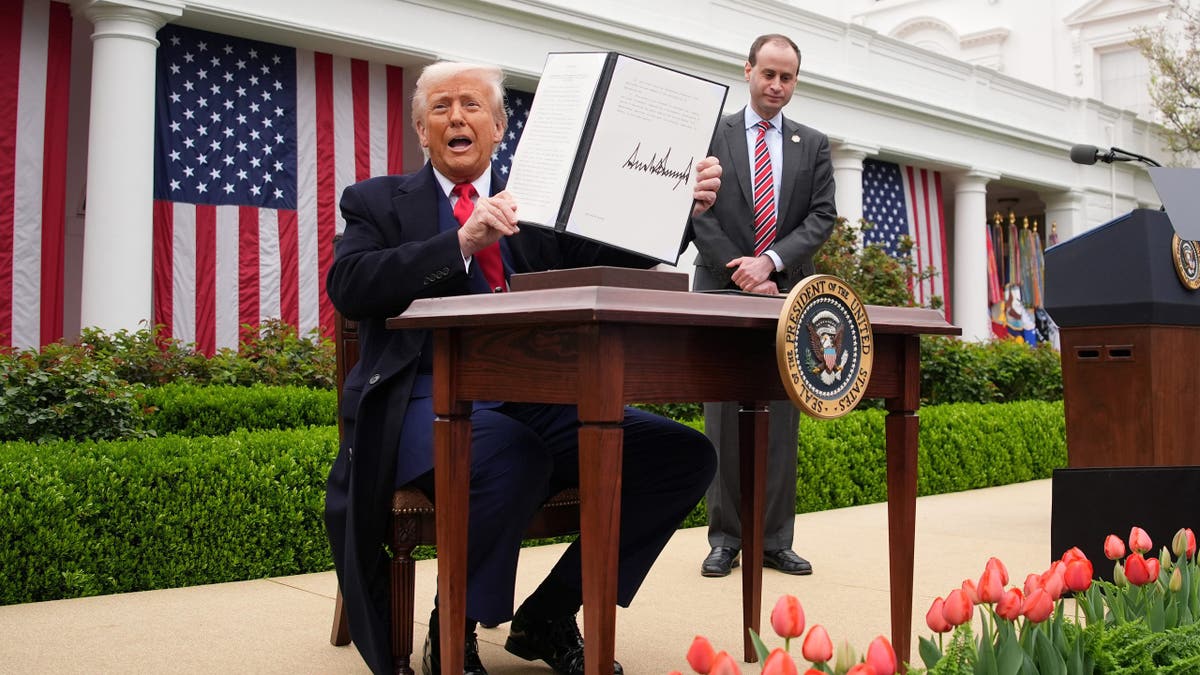
President Donald Trump displays a signed executive order imposing tariffs on imported goods during a «Make America Wealthy Again» trade announcement event in the Rose Garden of the White House April 2, 2025. (Getty Images/Andrew Harnik)
TRUMP OPEN TO MEET PUTIN FACE-TO-FACE NEXT WEEK FOLLOWED BY THREE-WAY TALKS WITH UKRAINE’S ZELENSKYY
«It is going to be another factor that’s going to pressure Putin to agree to a ceasefire. I don’t know if that’s going to happen immediately or in a few months, but I think it is going to put real pressure, inflict real pain on Russia,» Fleitz said.
Once a staunch Trump ally, Rep. Marjorie Taylor Greene, R- Ga., took to X this week in response to a post by Trump that he would be enforcing tariffs on India for purchasing Russian oil and said, «End Indian H1-B visas replacing American jobs instead and stop funding and sending weapons to the Obama/Biden/Neocon Ukraine Russia war.»
Trump’s favorable transition toward Ukraine and European allies has also ruffled some MAGA feathers, though security experts have argued it has given the president better leverage to take on major adversaries like Putin, and by extension, China.
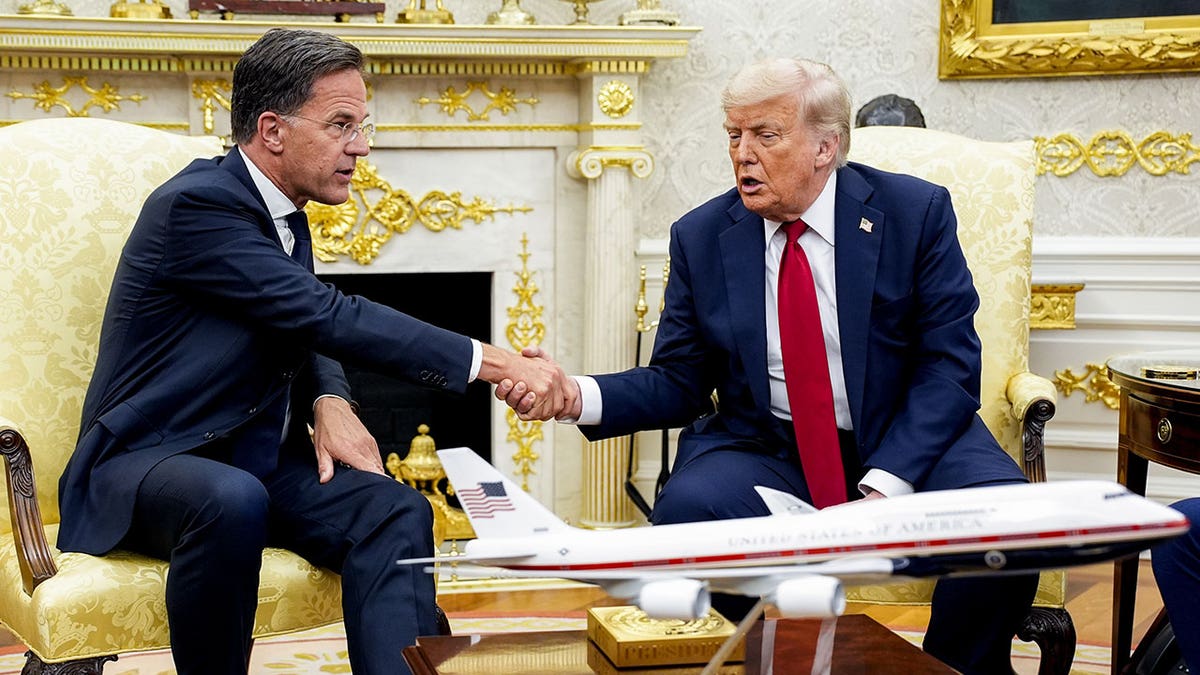
President Donald Trump, right, and Mark Rutte, NATO secretary general, shake hands during a meeting in the Oval Office of the White House in Washington, D.C., July 14, 2025. (Yuri Gripas/Abaca/Bloomberg via Getty Images)
CLICK HERE TO GET THE FOX NEWS APP
«Diplomacy and negotiations are a good thing,» said Fleitz, who serves as vice chair of the America First Policy Institute’s Center for American Security. «Peacemaking takes time, and the U.S.-Russia relationship was in a very bad situation when Trump came to office.
«I think these sanctions will hurt Russia very badly,» Fleitz continued. «The fact that Trump knows that secondary sanctions on India has, at least temporarily, hurt our relationship is really a remarkable sign of how committed Trump is to these sanctions.
«There’s not going to be exceptions. It’s not going to be some type of soft strategy with all kinds of loopholes,» he added. «I think it shows to Putin how serious Trump is, and it gives Trump leverage to negotiate with Putin.»
donald trump,vladimir putin,russia,india,china,world,sanctions

 CHIMENTOS3 días ago
CHIMENTOS3 días agoMalas noticias para Wanda Nara: por qué la bajaron misteriosamente de MasterChef: «No va a salir este año»

 POLITICA3 días ago
POLITICA3 días agoAxel Kicillof reclamó ante la Corte Suprema $12 billones que le adeuda Nación

 POLITICA2 días ago
POLITICA2 días agoSebastián Pareja justificó el armado de listas de LLA en la Provincia: “El desafío era dar una opción diferencial”






















